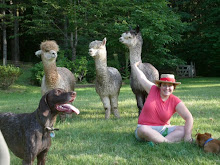 Last night, I had dinner at my friend Laura Ohm's. Laura directs all the non-bread related food operations for Grand Central Bakeries in the Portland area, and is without a doubt, the best cook that I personally know. Before leaving, she gave me a sample of their newest experiment, an artisan power bar known as the "bicycle bar" in its beta stage. From what I gather, it's an enhanced fig newton made with identifiable ingredients.
Last night, I had dinner at my friend Laura Ohm's. Laura directs all the non-bread related food operations for Grand Central Bakeries in the Portland area, and is without a doubt, the best cook that I personally know. Before leaving, she gave me a sample of their newest experiment, an artisan power bar known as the "bicycle bar" in its beta stage. From what I gather, it's an enhanced fig newton made with identifiable ingredients. I joked that I would probably be eating it on my way home, but restrained myself enough to make it home and forget about the treasure in my purse. This morning, after the dogs (yes, dogs plural at the moment) awakened but before I had given up on staying asleep, I heard the distinct sound of papers rustling. "What could they possibly be getting into...whatever it is, it can't be that bad, it's just paper..." A little while later, when I was fully cognisant, and hungry, did I discover the half eaten Grand Central bag with no evidence of a bicycle bar ever existing. The offender, of course, was my dog Victor. I know this because like his mother he is food motivated and because he did the same thing with 4 donuts earlier last weekend.
So. Breakfast option #1 gone, I turned to breakfast #2. Remembering the summer I toured the then-Soviet Union back in 1988, I thought of all the cucumbers I was served for breakfast and my own cucumbers sitting idly by in the fridge. Cucumbers are a kind of gourd, of course, like melons and also squash. All of these pack a lot of water but little else in the way of nutrition. Still, I can enjoy cucumbers with salt, pepper and a splash of vinegar any time of day; why should morning be so precious? I hard-boiled my remaining egg and plucked some cherry tomatoes from the yard and, lacking only a wedge of some salty sheep's cheese, broke my fast Balkan style. A good reminder to consume as many vegetables as possible when fresh, local and in season...and that no food is safe around Victor.
Oh, and the spot on the left of the plate is a chip in my slowly disintegrating Heath Ceramics tableware collection, which I am also choosing to blame on my dog.



